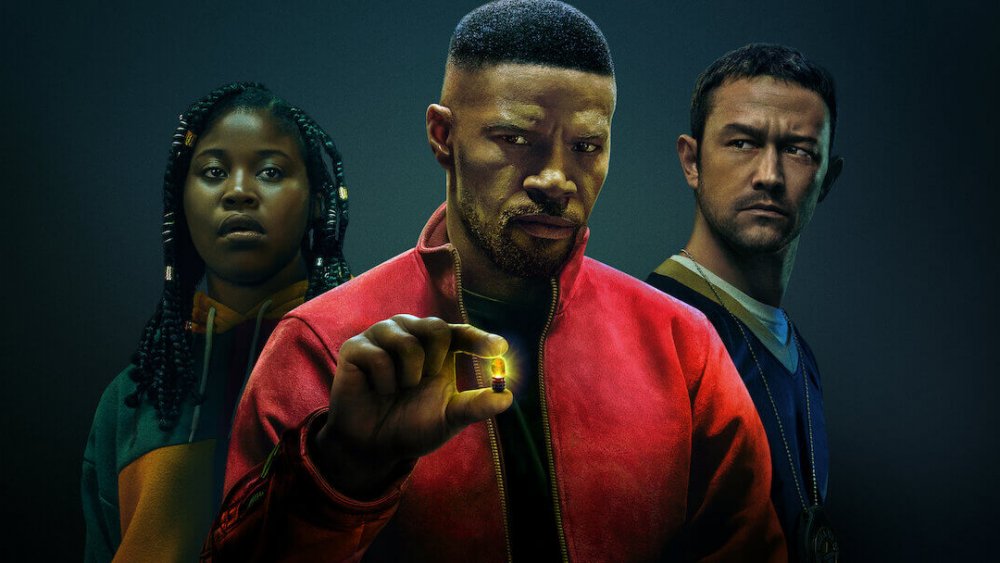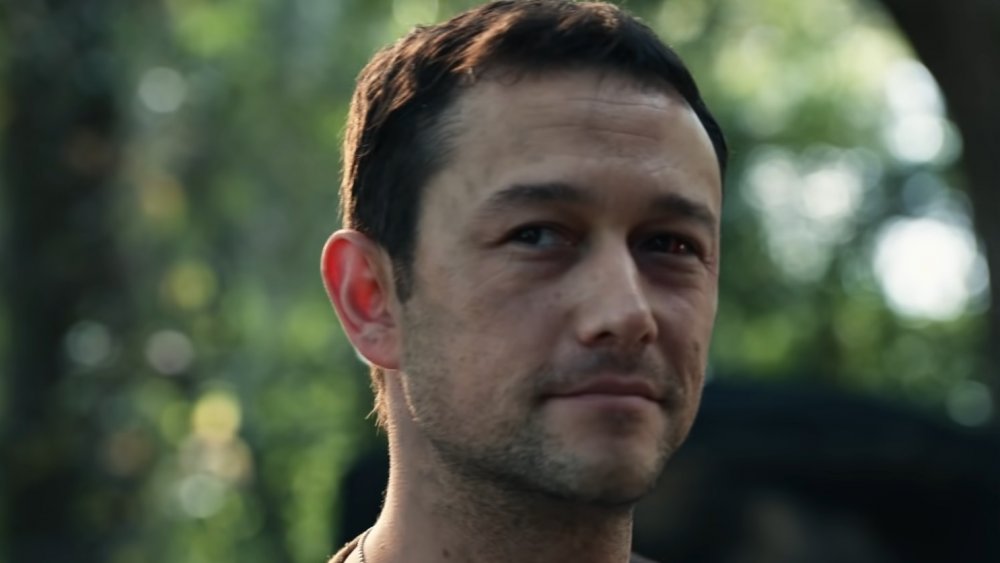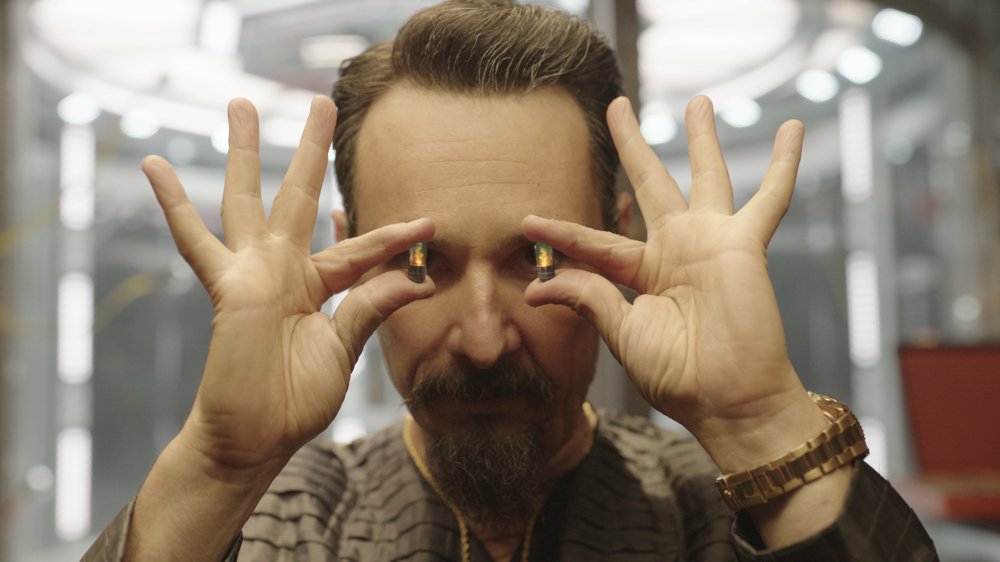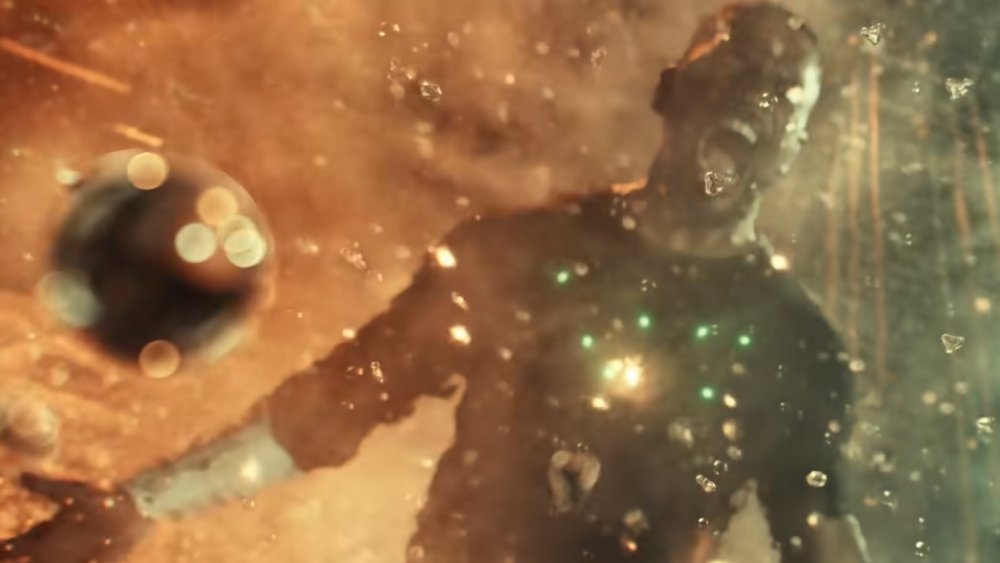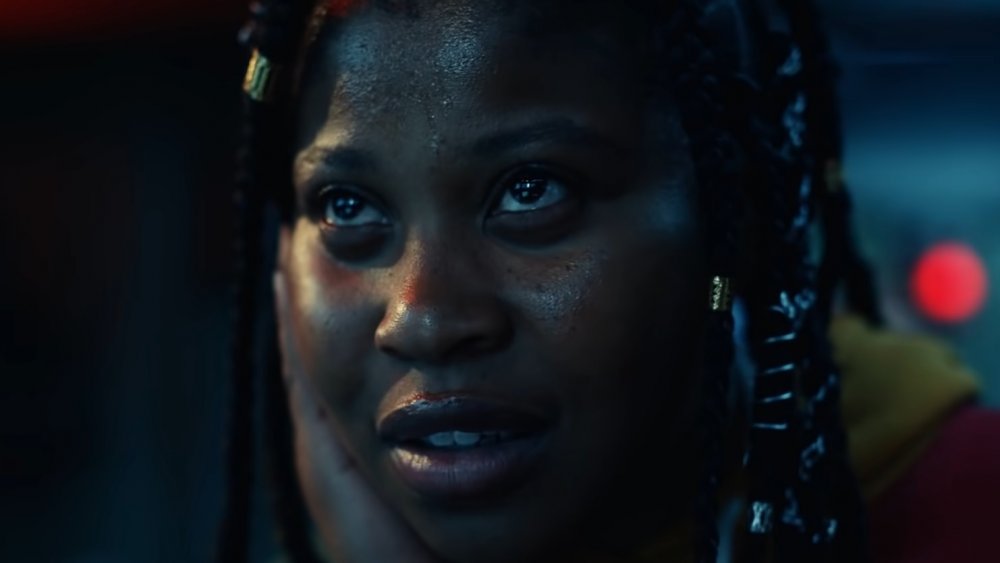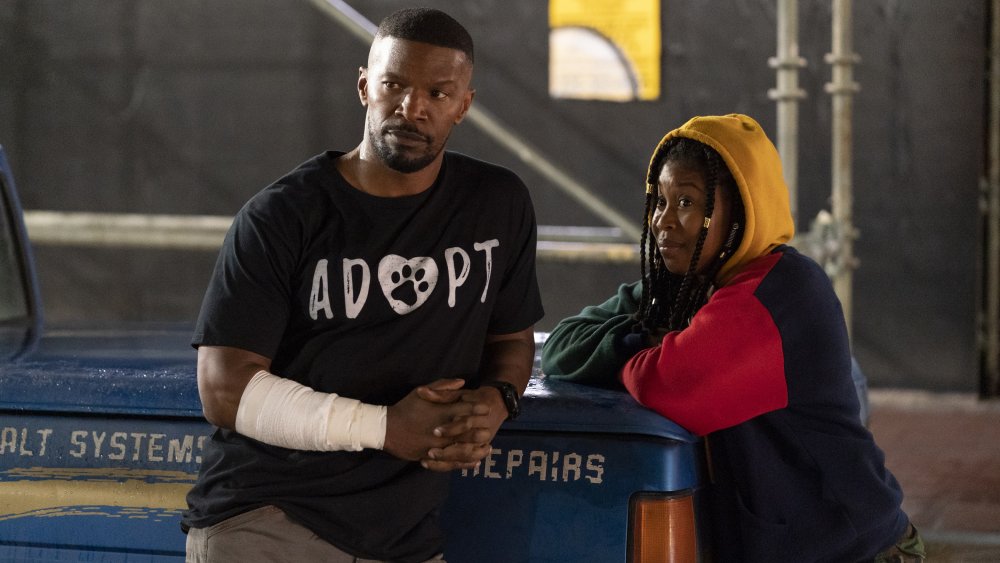The Ending Of Project Power Explained
Contains spoilers for Netflix's Project Power
How would the playing fields be leveled if there was a drug that could give any ordinary person extraordinary power? That's one of the questions posed by Netflix's new original sci-fi action blockbuster Project Power. As it turns out, the answer is anything but simple.
At the beginning of the movie, we're introduced to Robin (Dominique Fishback, in a star-making performance), a young drug dealer raising money for her sick mother's medical expenses. She's peddling an intense substance recently introduced to the streets of New Orleans referred to as Power, which imbues the user with a specific superhuman ability for five minutes. The catch is that everyone's power is different, so if yours ends up being spontaneous combustion, your first dose of Power will be your last.
One of Robin's clients is Frank (Joseph Gordon-Levitt), a well-intentioned New Orleans Police Department cop who wants to use the drug to establish equality between the police and the super-powered criminals who are wreaking havoc in his city. Over the course of one night, Robin and Frank become embroiled in a shadowy conspiracy when Robin is kidnapped by Art (Jamie Foxx), a military veteran desperate to find the people behind Power, who have taken his daughter, Tracy (Kyanna Simpson).
While the imaginative, propulsive action and inventive story may be the draw of Project Power, as they are with all great sci-fi, the film is also rich with allegorical meaning. If you've finished watching and are wondering what the message behind it all is, we've got you covered. Join us as we unpack everything and explain the ending of Project Power.
Frank realizes Power's corruption goes all the way to the top
The last act of Project Power begins after we see Art disrupt a demonstration of Power held by Telios, the military defense contractor developing the drug. He's finally apprehended by Frank, who has been trying to track him down after his captain (Courtney B. Vance) tells him that Art is heavily involved in the distribution of Power. However, once they're in the car together, Art tells Frank that the captain, who's clearly in league with Telios in some way, is setting him up.
Frank is extremely skeptical of Art. A few minutes earlier, Frank told Robin not to trust Art because he's just using her to achieve his own goals. She responded, "What, and you don't? At least he's being honest about it." When a Telios van shows up to intercept Frank and Art on their way to the police station, Frank realizes that there was wisdom in Robin's statement. Even though Art has his own agenda, he's never been dishonest about it — and he is, indeed, telling the truth about Frank's captain having ulterior motives.
Frank's captain betraying him is an important thematic moment in Project Power. Earlier in the action, Art says of the possibilities of Power, "In the real world, the power goes where it always goes — to the people who already have it." In this instance, the leaders of the NOPD are the people who already have power, and they're working to keep it. Frank believes in his personal mission to keep the people of New Orleans safe, but he realizes the people at the top of the system he works within don't share that goal, and likely never will.
Telios reveals its immoral mission
Thankfully, Frank manages to get away before he can be murdered, and Art allows himself to be taken because he knows it will get him closer to the person at the top of the operation. This person is Gardner (Amy Landecker). Thanks to a flashback, we know Gardner experimented on Art when he was an early test subject for Project Power. She's also the one who organized the kidnapping of Tracy. Because she was born after Telios experimented on Art, Tracy has the abilities of Power without actually having to take a pill.
When Art is brought to Gardner on the docked ship she's operating out of, Gardner explains her justification for kidnapping his daughter. Using the example of Henrietta Lacks – a real-life Black woman who had cancer cells harvested from her body in the 1950s without her consent or knowledge that were later used in a number of important scientific breakthroughs (including the first immortalized cell line) — Gardner explains, "All of our greatest advancements began in darkness, Major. It's up to the pioneers to light the way."
That Gardner uses Lacks in her explanation for her motives is an important key to unlocking the major themes of Project Power. In the United States, there's a long and terrifying history of unethical medical experimentation on Black people and other minority communities, such as the Tuskegee Study. In the world of Project Power, Telios is continuing that history by experimenting on Art's daughter, Tracy, and using New Orleans, a majority Black city, as one of its testing grounds for the drug. Gardner justifies this by repeating the Telios line that Power represents "the next step in human evolution." But who's set to reap the rewards of that evolution? As Art pointed out earlier, the power will remain in the hands of people like Gardner.
Art's power is finally revealed
Now that Art has been captured, he's restrained in the hull of the ship. Earlier, we learned from a Telios representative that the powers people get from the drug are inspired by adaptations found within the animal kingdom, such as that of a chameleon. We also heard from Art that he'd only ever used his power once because it was so intense that it almost killed him. Now that he's tied up, Art explains to the guard who's assigned to watch over him that his powers are those of the pistol shrimp. While the pistol shrimp is small, it's able to shoot a jet of bubbles with such force that it produces a flash of extreme heat and sound, destroying everything in its path.
Art manages to escape the guard without using his power. Meanwhile, Robin and Frank have infiltrated the ship. Robin locates Tracy and breaks her out of the cell she's being kept in. They reunite with Art and Frank, but the foursome is eventually surrounded by Gardner's henchmen. With no other way out, Art takes a Power pill and lays waste to the Telios soldiers. Art's power is immensely destructive and so difficult to control that it ends up killing him. However, he's not dead for long, as Tracy is able to revive him using her own innate abilities.
Art's particular power is rich with metaphor. As a single person struggling against a giant system, he's functionally as small as the pistol shrimp — but he's also just as mighty when he needs to be. His ability also makes him an interesting foil to Robin and her relationship to Power.
Robin doesn't need pills to harness her own power
Earlier in the film, we learn that, despite the fact that she sells Power pills, Robin hasn't ever actually taken one herself because she thinks they are too dangerous. When looking at the three lead characters, Robin is the only one who doesn't come from a law enforcement background (like Frank) or military background (like Art). In fact, Robin is someone who exists almost completely outside of any kind of formal power structure. She's flunking out of school, her job is entirely off the books, and her life's dream is to become a rapper, a goal that relies on her own skills and hard work to achieve. Frank and Art have been enmeshed in the exact power structures that we see being corrupted by the Power pills, but Robin hasn't. Furthermore, while both Frank and Art use Power to achieve their goals, Robin refuses because she doesn't believe the risk is worth the reward.
After they've escaped from the ship, Art thanks Robin for helping him reunite with Tracy and tells her, "There's something great inside you, Robin — use it." Here, the film seems to be drawing a clear distinction between a power that's acquired from an outside source and the power that comes from within. Yes, the pills give Art extreme abilities, but they're so strong that he can't use it without killing himself in the process. Similarly, Frank uses Power to fight back against criminals, but every pill he buys is profiting Telios and only leading to more chaos. Robin, on the other hand, doesn't need to corrupt herself to use her innate powers of perseverance, compassion, strength, and street smarts.
Does the end of Project Power set up a sequel?
In the end, Project Power reaches a relatively happy conclusion. All four of our heroes manage to escape the ship and make it to dry land. Frank reveals that he's going to leak to a journalist – a type of professional that can often hold powerful people and institutions to account – what he knows about Telios and the corruption within the police department. Meanwhile, Art and Tracy ride off to begin a new life, while Robin reunites with her mother and reveals she has the money to pay for her operation.
Of course, at the end of any big summer blockbuster there's an inevitable question: Will there be a sequel? In the case of Project Power, the film doesn't explicitly set up a sequel, but there's certainly the groundwork for there to be one. When we learn a bit more about Telios, we find that the drug itself is actually just an early prototype and that part of the reason they're testing it out on the citizens of New Orleans is so they can develop another, more stable, version. And although Gardner and her ship are destroyed at the end of the movie, it's clear that the forces behind Power are much larger than one operation.
Additionally, before he leaves, Frank asks Art, "Do you think this is really over?" Art replies, "For me, it is." There seems to be an implication that it is, in fact, just the beginning, but whether we actually get a sequel remains to be seen. However, until we hear more, we still have lots to ruminate over thanks to the questions raised by the ending of Project Power.
